"The only thing we have to
fear is fear itself."
FDR
Judgement is
something we all do to ourselves, each other, our children and others'
children. However, this week and I hope in weeks to follow, we can remind
ourselves to withhold our judgement for the hour we are at The Wonder Studio.
If we can remind ourselves that we ALL love our children and understand
how that unifies us. This type of acceptance has the ability to transform
everyone in the room to be able to explore with freedom and without fear.
Years ago, when I was teaching full time, every day we would go
outside to play on the playground. And then at the end of the playtime,
the children would line up by the water fountain to get a drink. It was
time consuming and patience was difficult for all of us. But mostly I saw
that it was difficult for the adults. It was a choice for the children to
stand and wait for their turn and most of them chose to do so. One of the
teachers decided she should count to 10 while each child drank from the
fountain, in order to "make it fair". I saw that it did the
opposite...Before this "fair" practice came to be, some children
simply took a quick sip, while others took longer. It was clear that some
were more thirsty than others. The children easily understood this and
there was no pushing or pleading for the person in front to HURRY! After
the "count to 10" technique came into play, it became so much more
work. Now the adult was in charge and had to be counting for each child.
The children no longer had nice side conversations during the wait time,
it became monotonousness and boring as everyone was focused on
counting to 10 over and over again.
I saw many other
examples of this type of situation in which adults impose their
"ruling" over the children and in their well meaning intentions to
make life fair they strip away the child's sense of self-regulation and the
ability to think and develop empathy for others.
Children often take things from one another, knock down another's
building, say inappropriate remarks, etc...But if you listen and look closely,
they also show great generosity and their willingness to forgive is remarkable.
Too many times, we interrupt this generosity of spirit with our
"adult" way of thinking that life should be fair. When don't we
know that it isn't...
Are we brave
enough to adopt a philosophy of "waiting"? Can we
"wait" before we intervene with our idea of right or wrong? We
can try to at least begin with the least amount of intervention and trust that
our children will sometimes need our guidance but we can also trust that
problem solving is a skill they are innately driven to explore.
What is this teacher proposing, you may ask yourself? Is
this a free for all? Is it Lord
of the Flies?
Here's what I
suggest when a questionable incident occurs:
1. Wait...
2. If one of
the children is physically "hurting" another, do step in and say
"I won't let you hurt her (or me, or yourself!)."
3. If no
physical harm is looming...observe the reactions of the children.
4. Sometimes
tears will happen and it's a good idea to validate those feelings.
"You are upset that Daniel took your car."
5. Offer
support through a hand, a hug, or any other sign of respect (not distraction).
Often no tears
will happen and the children move on quickly and she will make a different
choice or find a new car. Sometimes Daniel might even return the car or
drop it later.
We watch and
withhold our judgement on both children. We trust that they are both
people with whom deserve our respect and they are learning how to communicate
with one another. One is not a bully and the other is not a victim.
What can a child learn when another child shares or does not share
with them?
What can we learn
about our children when we wait and trust our child's ability to problem solve?
Go ahead, leave a comment!
I dare you!


































Amazing post!!
ReplyDeleteWhen adults step back and allow children to deal with their own situations they [children] learn how to be true to themselves and competent. Parents can learn they can trust their childern's abilities to make their own way, even if it is different than might be expected.